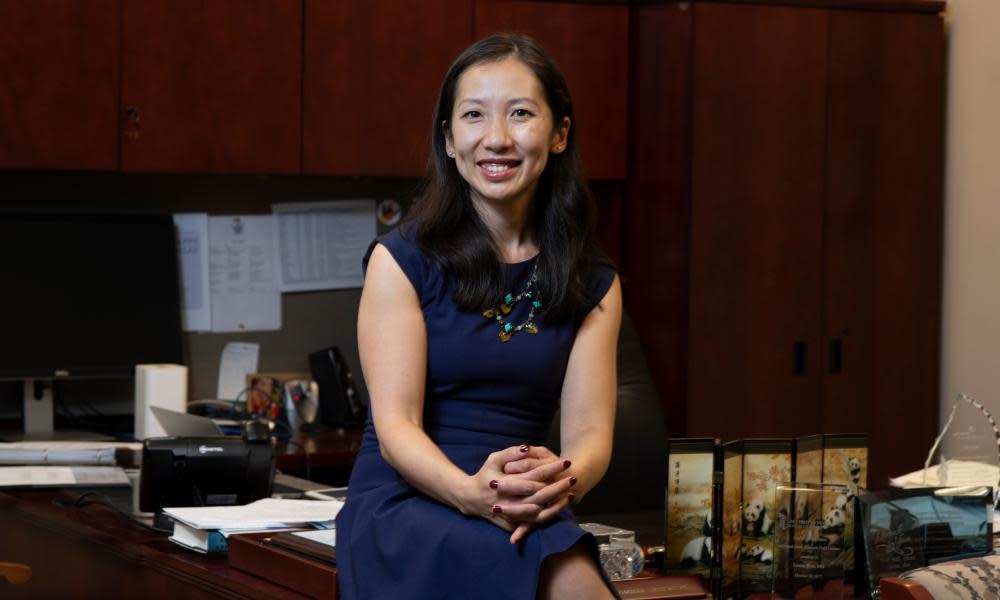Planned Parenthood's new president warns of 'state of emergency' for women's health

Dr Leana Wen takes over as president of Planned Parenthood – America’s biggest, best-funded and most vilified reproductive healthcare institution – at a time of unprecedented attacks on the organization’s values and work.
Last week, Alabama voters passed a fetal rights law; the Trump administration finalized rules to allow employers to opt out of health insurance requirements to provide birth control; and liberal women collectively held their breath as one of their champions – 85-year-old supreme court justice Ruth Bader Ginsburg, leader of the court’s liberal wing – was hospitalized with three cracked ribs.
To all this, Wen’s answer is to play offense.
“There is huge unmet need across our country, and it is our moral imperative to provide care for all those who need us,” Wen said, with the torch-carrying conviction of an emergency room physician who has seen too much in too little time. “I plan to expand our services, and expand our reach.”
Planned Parenthood has been controversial practically since its inception, more than 100 years ago. The group is the best known abortion provider in the United States, even though it argues abortion constitutes only 3% of its services.
The majority of their clinicians’ time is spent providing contraceptive and sexually transmitted disease tests. In recent years, the group has been a dartboard in the culture wars as social conservatives have sought to defund and regulate it out of existence.
This week, Wen starts as the organization’s sixth president in more than 100 years, the first doctor to lead the organization in more than 50 years, and comes to the job as a refugee who grew up poor in Los Angeles.
Wen immigrated to the US from Shanghai with her parents when she was 7, just after the Tiananmen Square massacre. She grew up in Los Angeles, where her father worked as a technology manager at the Chinese Daily News and her mother as a public elementary school teacher.
Like one in five Americans today, her family at times relied on Medicaid, America’s public health insurance program for the poor and disabled. Like one in five women in America, she and her mother were, at one time, patients of Planned Parenthood. Now, Wen is the mother of a 14-month-old son. She started her career as an emergency room physician.
“There is no question we are in a state of emergency for women’s health,” said Wen. When a society “treats one type of healthcare differently than everyone else, that’s when we get to where we are, which is the biggest healthcare crisis of our time.”
Wen takes the reigns from Cecile Richards, a woman who, after a decade helming the organization, was a heuristic hate figure for the right; a figure used to rile a rabid, Trumpian base, and the millions who cast ballots on abortion above all issues. From the state level to federal policy, Republicans have managed to pass restrictions on reproductive health and its funding, and critically confirmed Catholic justice Brett Kavanaugh to the US supreme court.
Wen has a history of organizing against these policies. In her work as health commissioner of Baltimore, Maryland, Wen spearheaded lawsuits against the Trump administration, including one which restored funding to the city’s teen pregnancy prevention program.
Despite these challenges, Wen also takes over as Planned Parenthood and healthcare have become rallying points for the left. Planned Parenthood experienced a surge of donations after Trump was elected and was a focal point during the Women’s March of 2017. In the midterm elections, access to health and its cost was Democrats’ unifying platform, and Wen’s stories from Brigham & Women’s and Massachusetts general hospital mirror the stories on which Democrats stumped.
“I can tell you countless of stories of what happens when people come in with an illness,” said Wen. “But the reason they have that illness isn’t just because of a disease, it’s because they didn’t have health insurance.”
As a resident in her early 30s, Wen examined a woman who waited a year to have the lump in her breast looked at, because she lacked healthcare. She was diagnosed with metastatic breast cancer and died shortly thereafter, leaving behind three young children. Then there was the woman who had a stroke because she cut her blood pressure medication in halves, then quarters, because she could not afford the drugs. She saw a young woman, pulseless on a stretcher, die from a home abortion.
“I strongly believe that healthcare must be guaranteed to all regardless of our ability to pay,” said Wen. “Regardless of what we look like, where we come from, our immigrations status, the zip code we live in, and all people should be treated with compassion and high quality care – that’s what a society should guarantee.”
“We are probably the only healthcare organization that has a presence in all 50 states,” Wen said. This, she said, is why she wants to expand. “Our health centers are beginning to provide mental healthcare, prenatal cate and postpartum care.”
Should there be single-payer in the United States, such as the platform more than half of Democratic candidates ran on this midterm election cycle? Wen stops just short of calling for it, but says this about healthcare: “It is a basic human right.”

 Yahoo News
Yahoo News 
